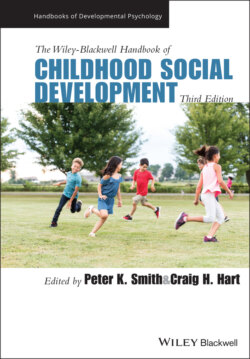Читать книгу The Wiley-Blackwell Handbook of Childhood Social Development - Группа авторов - Страница 104
Anthropology and Social Development in the 21st Century – Tentative Steps Towards Dialogue
ОглавлениеDespite this history, recent years have seen tentative steps towards rapprochement and an understanding of the need to work across disciplines to understand children’s social development holistically (Tatlow‐Golden & Montgomery, 2021). Spurred on, in part, from the insights of the New Social Studies of Childhood, many of the assumptions of 20th‐century psychology are now actively being critiqued from within: increasing visibility is being accorded to developmental psychologists who take cultural, sociological, ethnographic, or child‐centered approaches to studying children and childhoods, and build contextualized understandings of concepts such as social development into studies of children’s lives. Social psychologists such as Martin Woodhead (1999) and Erica Burman (1996) have challenged the idea that “social constructionism” and “psychology” are mutually exclusive terms and rejected the idea that children’s development can be viewed as a universal, unidirectional process of maturation which can be identified in a single cultural setting with simple experimental studies. Increasingly too, psychologists from Africa and Asia are beginning to question the use of the Western child as the developmental norm (Serpell & Marfo, 2014).
There is also a growing recognition that some psychologists have, since the 1970s, and indeed long before the rise of the New Social Studies of Childhood, argued that social development should be seen as a series of culturally and environmentally situated and transactional series of processes (see Chen & Eisenberg, 2012) and that these need not be incompatible with child‐centered research. This is particularly the case with the increasing use made of cultural‐ecological models within the New Social Studies of Childhood, especially those developed by Urie Bronfenbrenner (1997). His bio‐ecological model of human development, generally presented as a set of nested circles radiating out from the child, representing the contextual systems in their environment, definitively places the child at the center of research and recognizes the interplay between the levels of influences and – implicitly – the child’s agency (Tatlow‐Golden & Montgomery, 2021). Other psychologists have also used cultural‐ecological models to cross disciplinary boundaries. Barbara Rogoff (1990, p. vii), for example, in her cross‐cultural work with children, coined the phrase “‘guided participation” and stated that: “child cognitive development is an apprenticeship – it occurs through guided participation in social activity with companions supporting and stretching their understanding of and skills in using the tools of culture” – a conclusion similar to that detailed in the work of David Lancy. Her subsequent work (2003) has reinforced the idea that individuals and cultures shape each other, and that development is a continual and lifelong process of transformation through both adults’ and children’s interactions with cultural practices and institutions.
This turn towards interdisciplinarity has not been one‐way. There have been concerns that the anthropological notion that childhood is socially constructed has become a “theoretical orthodoxy” (Wyness, 2015, p. 19) and descended into cliché (Alanen, 2015). After all, childhood (however it is defined) is a distinct stage in the human lifecycle and anthropologists have found no cultures which do not distinguish between children and adults and, on a “common sense” level, people can usually recognize a child even if they cannot analyze or articulate what the category “childhood” means. Alan Prout, whose work was seminal to the development of the New Social Studies of Childhood, has cautioned against rejecting developmental and biological understandings of children and childhoods: “However illuminating it is to regard childhood as a social phenomenon, it is not and has never been purely social. In fact it is hard to envisage what a ‘purely social’ phenomenon would look like” (Prout, 2005, p. 2).
Other orthodoxies, once central to the New Social Studies of Childhood, have also been challenged and rethought in the new millennium. The idea that children are social actors in the here and now, who needed to be theorized as people in their own right – the human “beings” of the New Social Studies of Childhood rather than the human “becomings” of developmental psychology or the subjects of socialization – has ultimately proved to be yet another limiting binary as it reinforces the notion that adulthood is a complete, stable, and independent end point, which is not subject to change over time (Uprichard, 2008). Lee (2001, p. 103) argues that in a postmodern world, both children and adults experience lives that are changeable and unstable, “fundamentally dependent and incomplete,” and that differentiating between being and becoming, whether psychologically or anthropologically, makes little sense.
Other work which has tried to bridge the disciplinary gap, and which has drawn heavily on anthropological studies, has come from recent work on psychology and children’s rights. This acknowledges the intellectual problems that psychologists have struggled with over the concept of children’s rights (struggles that have been shared with anthropologists, see Montgomery, 2017) such as whether principles such as morality, dignity, equality, or respect are Western‐based philosophical notions which have limited meaning outside the West; whether any human is really truly rational (or a mass of instincts springing from evolutionary processes); or whether children are largely the subjects of socialization or active agents. Recent work on rural and urban Chinese children’s view of rights, for example, and their relationship to development, socialization and well‐being (Helwig & Turiel, 2017) has successfully synthesized ethnographic accounts of socialization from the American tradition, understandings of children’s agency and their importance as informants from the New Social Studies of Childhood, and psychological theories of moral socialization. In such work, social development and cultural processes are seen through the lens of children’s perspectives rather than adult socialization practices, and are overlaid with questions about universality and cultural relativism. While neither anthropologists nor psychologists can answer these definitively the fact that they are asking the same questions and drawing on the learning and experiences of the other discipline is grounds for hope for future dialogue.
